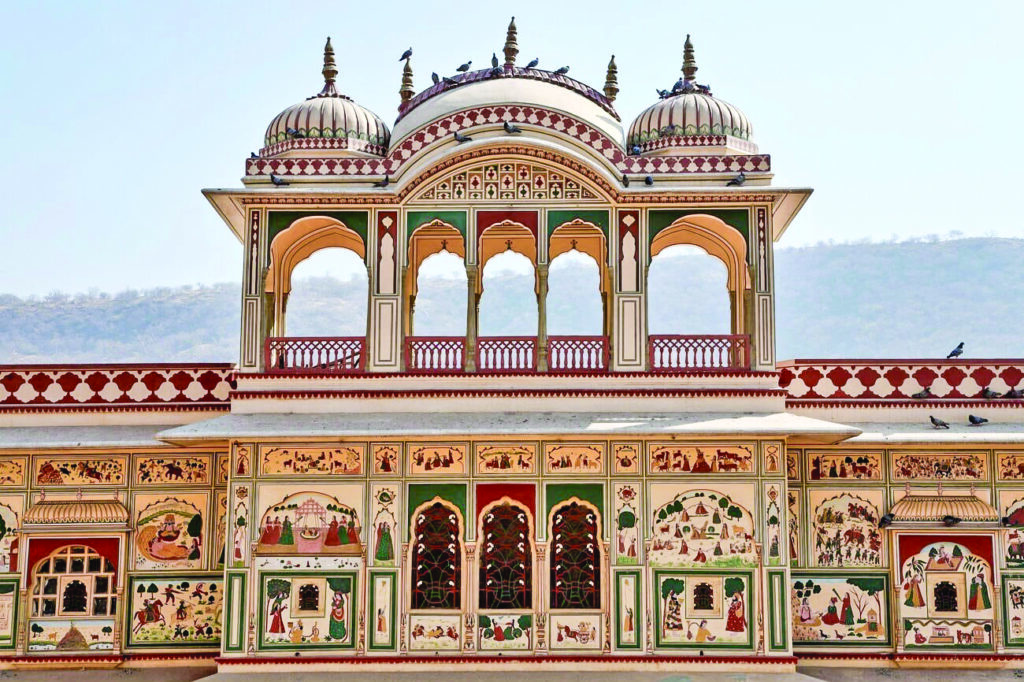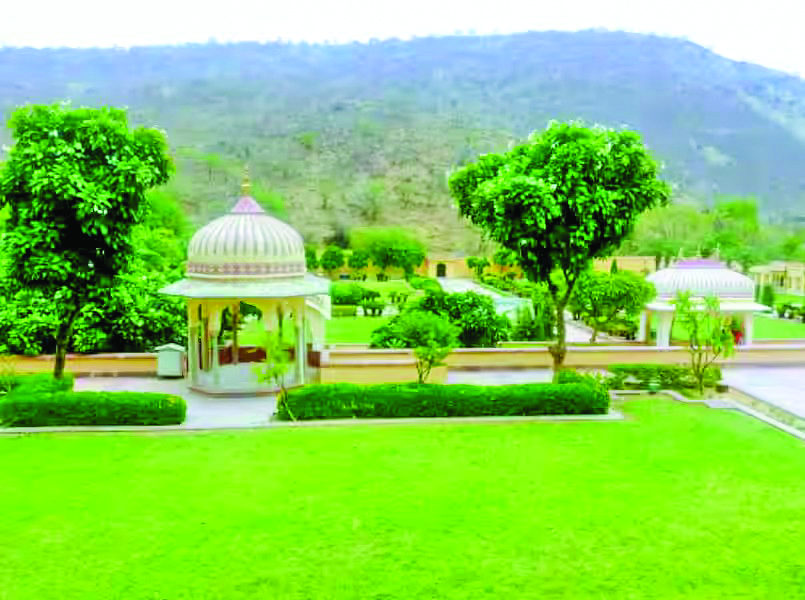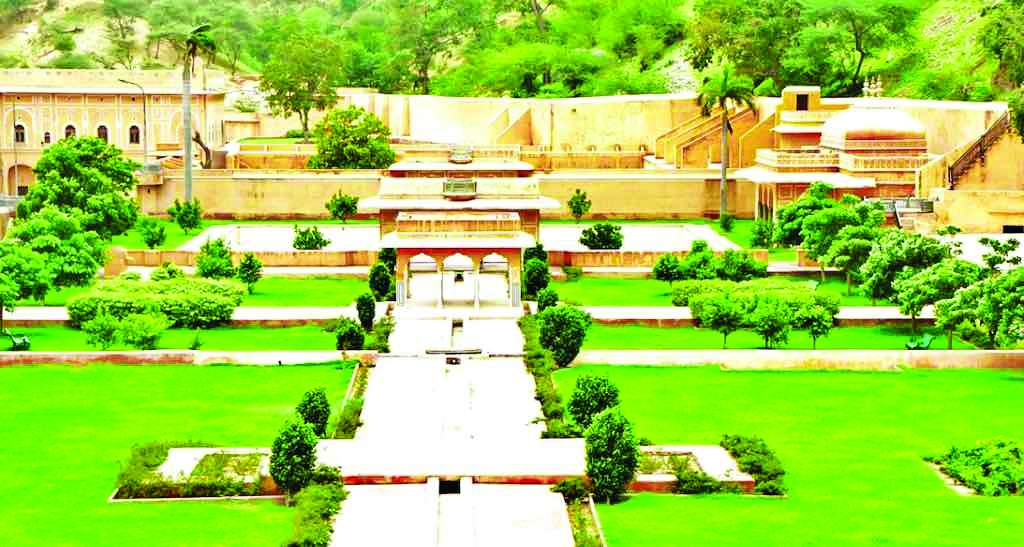Sisodia Rani Bagh is a quiet oasis nestled amid the lively metropolis of Jaipur, Rajasthan’s capital. Maharaja Sawai Jai Singh II commissioned this stunning garden complex in the early 18th century as a private retreat for his loving queen, Sisodia Rani.
The Sisodia dynasty, renowned for their artistic prowess and architectural brilliance, left an indelible mark on this enchanting space. Sisodia Rani Bagh stands as a testament to their passion for blending the natural world with exquisite design, creating a harmonious sanctuary where visitors can immerse themselves in the rich cultural heritage of Rajasthan.
The story of Sisodia Rani Bagh is deeply intertwined with the history of the Sisodia clan, one of the most illustrious royal families in the region. The Sisodias, known for their unwavering courage and their patronage of the arts, rose to prominence in the 16th century, when they established their capital in the city of Udaipur. Over the centuries, the Sisodia rulers left an indelible mark on the architectural and cultural landscape of Rajasthan, their vision and creativity shaping the iconic landmarks that have come to define the state.
Maharaja Sawai Jai Singh II, the visionary behind the creation of Sisodia Rani Bagh, was a remarkable figure in his own right. As the founder of the planned city of Jaipur, he was a clever political strategist and a passionate patron of the arts. It was during his reign that the Sisodia dynasty reached the zenith of its power and influence, with the construction of Sisodia Rani Bagh serving as a testament to the family’s enduring legacy.
A Riot of Color and Fragrance, The Lush Landscape of Sisodia Rani Bagh
As you step into Sisodia Rani Bagh, you are immediately enveloped by a riot of colors and captivating fragrances. The meticulously landscaped gardens are a true feast for the senses, with vibrant flowers, towering trees, and serene water features that create a tranquil ambiance.
The centerpiece of the garden is a series of stunning terraced lawns, each adorned with intricately carved marble pavilions and serene reflection pools. Cascading fountains and delicate water channels add a soothing soundtrack to the serene atmosphere, transporting visitors to a realm of relaxation and rejuvenation.
One of the most remarkable features of Sisodia Rani Bagh is the abundance of lush greenery. Towering palm trees, fragrant jasmine vines, and a diverse array of flowering plants create a verdant oasis that is a true respite from the bustling city beyond the garden’s walls. The meticulous attention to detail in the landscaping is a testament to the Sisodia dynasty’s commitment to creating a harmonious synthesis between nature and human artistry.
As you wander through the gardens, you can’t help but be struck by the sheer diversity of the plant life. From the vibrant bougainvillea that cascades over the pavilion walls to the towering date palms that provide cooling shade, every corner of Sisodia Rani Bagh is a botanical treasure trove. The careful selection and placement of these plants, with an eye for color, texture, and seasonal blooms, create a constantly evolving tapestry of natural beauty that captivates visitors throughout the year.

The exquisite pavilions of Sisodia Rani Bagh
As you wander through the serene gardens of Sisodia Rani Bagh, you cannot help but be captivated by the stunning architectural gems that dot the landscape. The pavilions, or “baradaris,” are the crown jewels of this enchanting complex, showcasing the Sisodia dynasty’s unparalleled mastery of Rajasthani design.
The most prominent of these pavilions is the Sisodia Rani ki Baradari, a breathtaking marble structure that serves as the focal point of the garden. Adorned with intricate carvings, delicate latticework, and serene reflection pools, this pavilion is a true masterpiece of Rajput architecture. The interplay of light and shadow, coupled with the pavilion’s elegant proportions, creates a mesmerizing visual experience that captivates visitors from around the world.
Beyond the Sisodia Rani ki Baradari, the garden is dotted with a series of smaller pavilions, each with its own unique charm and architectural features. These structures, with their ornate facades, carved columns, and serene alcoves, serve as enchanting retreats where visitors can pause, reflect, and immerse themselves in the timeless beauty of Rajasthani design.
One of the most remarkable aspects of the pavilions is the attention to detail that permeates every aspect of their construction. From the intricate jali (latticework) patterns that filter the sunlight to the delicate inlays of precious stones that adorn the walls, every element of these structures is a testament to the Sisodia dynasty’s unwavering commitment to excellence. It is as if the very stones of these pavilions have been imbued with the rich cultural heritage and artistic vision of their creators.

A Canvas of Color, The Stunning Murals of Sisodia Rani Bagh
One of the most captivating aspects of Sisodia Rani Bagh is the stunning collection of murals that adorn the walls and ceilings of the pavilions. These vibrant, intricate paintings are a true feast for the eyes, showcasing the exceptional artistic talent of the Sisodia dynasty’s court artists.
The murals depict a wide range of scenes, from majestic hunting parties and regal processions to serene landscapes and mythological tales. The use of vibrant pigments, including rich blues, deep reds, and vivid greens, creates a sense of dynamism and energy that draws the viewer into the captivating narratives.
As you wander through the pavilions, you can’t help but be mesmerized by the intricate details of the murals. The artists’ masterful use of perspective, their attention to the nuances of human and animal anatomy, and their ability to capture the essence of Rajasthani culture all contribute to the breathtaking quality of these works of art.























